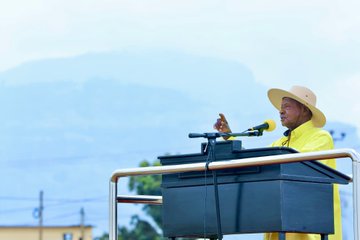Mbale — President Yoweri Kaguta Museveni has called on National Resistance Movement (NRM) leaders in the Bugisu sub-region to remain focused on the party’s long-term development agenda and resist what he termed as misinformation from opposition politicians.
Addressing 17,725 NRM leaders at Mbale Secondary School grounds on Sunday, November 16, 2025, the President—also the NRM national chairman—accused opposition figures of “distorting facts,” misunderstanding national planning frameworks, and advocating for short-term priorities such as salary increments at the expense of strategic investments.
“NRM has no problem. Our analysis is correct, and our strategy is correct. That’s why we were able to defeat all these groups, even in the war, even when we started with 27 people,” Museveni said.

He urged leaders to defend the government’s focus on wealth creation, industrialisation, and value addition, saying these pillars remain central to achieving economic transformation.
Infrastructure, Power and Industrial Growth
Museveni highlighted major national investments—including power generation, industrial parks, and strategic roads—as essential for unlocking jobs and expanding Uganda’s tax base. He pointed to the ongoing discussions around the Mbale–Namagumba–Bududa–Nalugugu road, arguing that while the project is important, the government must balance regional needs with national priorities.
“Sometimes the priorities are not correct,” he said. “We would have done these roads long ago, but the priorities of our partners are not always the same.”

The President criticised some 2026 presidential contenders—particularly those who previously served in Parliament—for “failing to support critical development projects” while now attacking the government over unfinished road works.
He singled out Nandala Mafabi, Mugisha Muntu, Robert Kyagulanyi and Mubarak Munyagwa, saying they “had a chance in Parliament to think but never did.”
Economy Growing Fast, Industrial Parks Expanding
Museveni praised Uganda’s current economic trajectory, citing a 7% growth rate, with projections of exceeding 10% once oil production begins. He highlighted growth in the industrial, hospitality, and manufacturing sectors.
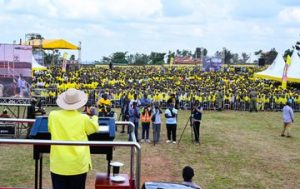
The President showcased the rapid expansion of Uganda’s industrial zones: Sino-Mbale Industrial Park: 75 factories, 12,000 workers; Namanve Industrial Park: 273 factories, 44,000 workers; Kapeeka Industrial Zone, Mukono and Matugga clusters: Growing manufacturing capacity; Matugga: Home to one of the world’s largest pharmaceutical plants and Kiira Motors in Jinja: Now assembling vehicles locally.
He noted that major foreign manufacturers initially rejected Uganda’s push for local vehicle assembly until Kiira Motors made progress. “I said sorry, it’s too late,” he remarked.
On energy, Museveni pointed to the 640MW Karuma Dam as a transformative investment that enables industrial growth, contrasting it with the ageing Jinja dam, which had dropped to only 60MW.
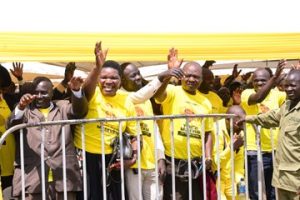
Value Addition: “Stop Exporting Raw Coffee”
Revisiting point five of the NRM’s Ten-Point Programme, Museveni urged Bugisu farmers to fully embrace value addition, especially in the coffee sector.
He criticised Africa’s low share of global coffee earnings—USD 2.5 billion out of a worldwide USD 460 billion—attributing it to the continued export of raw beans.
He said Ugandan farmers earn USD 4.2–4.5 per kilogram of robusta coffee, but could double that income if processing was done locally. Exported processed coffee, he noted, fetches between USD 22 and USD 40 per kilogram on the international market.
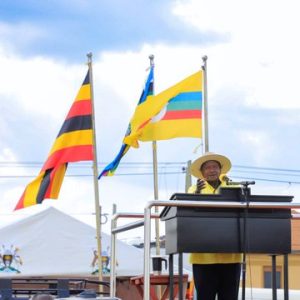
“If you all listen to our message, Uganda is so rich that we would be helping other countries, not the other way around,” he said.
Fight Against Corruption and Strengthening Local Governance
Museveni said he introduced the Local Council (LC) system to dismantle colonial-era structures plagued by corruption. He urged LC leaders to closely monitor civil servants who mismanage public resources.
Speaker of Parliament and NRM Second National Vice Chairperson Anita Among hailed the LC structure as the backbone of community governance, describing LC1 chairpersons as “presidents of their villages.” She thanked the President for increasing their monthly pay from UGX 10,000 to UGX 100,000.
“The votes are within our members, not outside,” she said, urging leaders to rally grassroots support ahead of the 2026 elections.
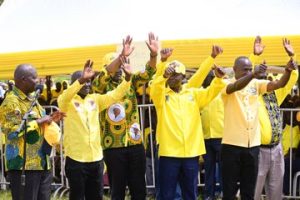
Among also revealed an expansion of Parish Development Model (PDM) funds to include UGX 15 million per parish for leaders and their SACCOs.
NRM Secretary General Richard Todwong reminded leaders of their duty as “social doctors” who must understand household dynamics and community needs.
Hon. Calvin Echodu, NRM Vice Chairperson for Eastern Region, assured the President that Bugisu remains loyal and fully mobilised.
The Mbale meeting drew a wide representation of NRM structures, including members of the Central Executive Committee, district chairpersons, MPs and MP flag bearers, sub-county and parish leaders, and thousands of LC1 leaders.









